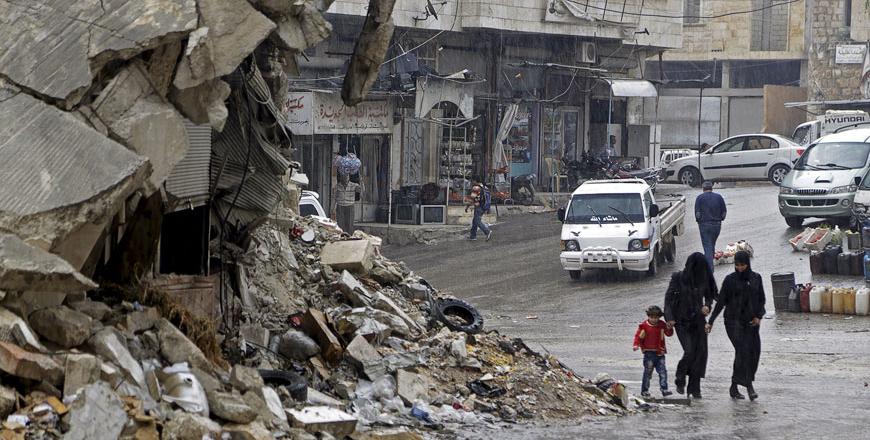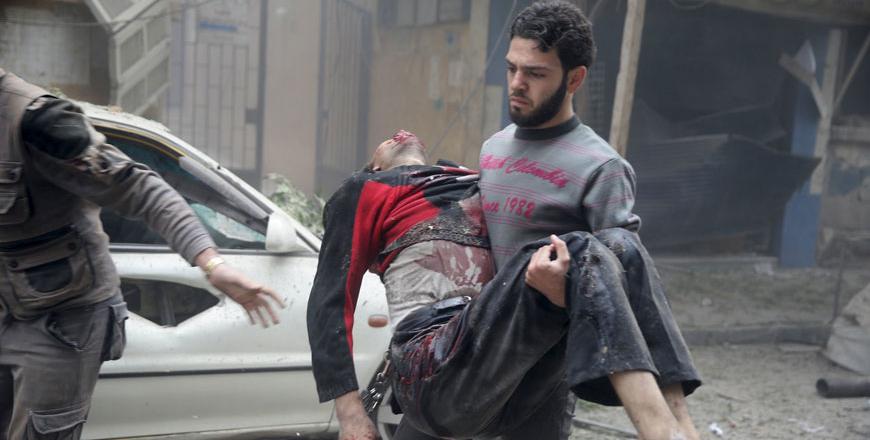You are here
Arch-rivals Saudi Arabia, Iran to discuss Syria face-to-face for first time
By Reuters - Oct 28,2015 - Last updated at Oct 28,2015

Civilians walk in the rain past a damaged building in the rebel-controlled area of Maaret Al Numan town in Idlib province, Syria, on Wednesday (Reuters photo)
RIYADH/DUBAI — Saudi Arabia and Iran announced they would attend international talks in Vienna on Friday on the war in Syria, in the first meeting between the regional adversaries aimed at ending the four-year-long war.
Saudi Arabia said its participation in the talks aimed to gauge the willingness of Russia and Iran, the Syrian government's main backers, for a peace deal, Foreign Minister Adel Al Jubeir said on Wednesday.
"The view of our partners ... was that we should test the intentions of the Iranians and the Russians in arriving at a political solution in Syria, which we all prefer," Jubeir told a news conference in the Saudi capital Riyadh.
Iranian Foreign Minister Mohammad Javad Zarif and three of his deputies will attend the multilateral talks, Iranian state news agencies said earlier on Wednesday.
It will be the first time that Tehran attends international negotiations on Syria’s war. Other participants, notably the United States, say Assad can play no part in Syria’s future.
The Saudi foreign minister added that the kingdom and its allies would hold a separate meeting on Friday to seek “the time and means of Bashar Al Assad’s exit”.
Egypt, Iraq, Qatar, Lebanon, the European Union and France also said they would attend Friday’s talks, which come a day after a smaller round of negotiations between the United States, Russia, Saudi Arabia and Turkey.
Around a dozen participants are expected in total.
It was not clear whether any invitation had been issued to either the Syrian government or the opposition. Neither side was present at the last talks in Vienna.
Two most powerful countries
Speaking at a news conference alongside his Saudi counterpart, British Foreign Minister Philip Hammond said he hoped the meeting would encourage dialogue between the rivals, who back opposing sides in conflicts across the Arab world.
“Saudi Arabia and Iran are the two most important and powerful countries in this region. It is very much in the long-term interests of the region that eventually these two countries are able to talk to each other, are able to discuss differences, are able to seek solutions peacefully,” Hammond said.
The Syrian National Coalition, an opposition group based in Turkey and backed by Western powers, said Iran’s participation in the talks would undermine the political process.
“Iran has only one project — to keep Assad in power... They don’t believe in the principle of the talks,” said the coalition’s vice-president Hisham Marwa.
The secretary of Iran’s Supreme National Security Council told reporters during a visit to Pakistan on Wednesday that Tehran had entered the Syria talks “with no pre-conditions”.
A senior Western diplomat in New York said on Wednesday: “We have got to start from a fairly low base given that you’ve got Russia and Iran on one side and everyone else on the other.”
“It would be successful if (the meeting) came off and didn’t completely fall apart,” he added.
Turkey, which backs the anti-Assad opposition, has no objection to Iranian participation in the Syria talks, a diplomatic source in Ankara said.
Turkish foreign ministry officials were not immediately available for comment.
Iran’s first test
“Iran was always saying that without it the talks on the Syrian crisis would not succeed. What has changed is that Russia and the United States have come to the same conclusion,” said Ali Sadrzadeh, an Iranian political analyst in Frankfurt.
He said the summer’s nuclear deal between Iran and world powers had paved the way for Tehran’s participation in the international arena, adding: “The Vienna talks will be Iran’s first test.”
EU foreign policy chief Federica Mogherini, who will take part in the talks, welcomed Iran’s participation. After a phone call with the Iranian foreign minister on Wednesday, she tweeted: “Important to have all relevant regional actors at the table on Friday in Vienna.”
Fighters from Iran and its Lebanese ally Hizbollah are taking part in ground offensives being waged by the Syrian army and its allies with Russian air support, senior regional officials say.
Revolutionary Guards Deputy Commander Hossein Salami said in an interview on state TV on Monday that Iran had increased its military presence in Syria in recent months to help its army.
“A few months ago the Syrian government asked us to help it reconstruct the army and also provide military advice for a massive operation. This required Iran to send more advisers there, so we increased both the quality and quantity of our military presence in Syria,” Salami was quoted as saying by the Fars news agency.
Iran says it supports a political solution in Syria, but says Assad should be part of the process. Opposition groups, and their regional backers including Saudi Arabia, Qatar and Turkey, say Assad must leave power as a precondition for peace.
“This is an acknowledgement of reality, four years into the conflict,” said Julien Barnes-Dacey, senior policy fellow at the European Council on Foreign Relations in London.
“Having Iran at the table complicates the goal of getting rid of Assad, but potentially opens the door to some kind of de-escalatory track,” he added.
Related Articles
VIENNA — The United States said on Thursday it hoped a new round of international talks on Syria's civil war would clarify whether Tehran an
Parties working to prevent Iran from participating in Syria peace talks in Switzerland next week will regret denying Tehran a role, Iran’s foreign minister said on Monday.
RIYADH — Syria's main opposition groups agreed at unprecedented talks Thursday to negotiate with President Bashar Assad's regime but insiste












